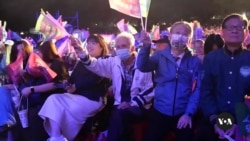ໃນວັນເສົາທີ່ຈະມາຮອດນີ້, ໄຕ້ຫວັນ ຈະທໍາການເລືອກຕັ້ງປະທານາທິ ບໍດີ ແລະສະມາຊິກສະພາຊຸດໃໝ່. ການລົງຄະແນນສຽງດັ່ງກ່າວ ຈະຊ່ວຍກຳນົດສາຍສໍາພັນຂອງໄຕ້ຫວັນ ກັບ ຈີນ ເຊິ່ງຂົ່ມຂູ່ທີ່ຈະເຂົ້າຢຶດເອົາເກາະນ້ອຍໆທີ່ເປັນປະຊາທິປະໄຕແຫ່ງນີ້. ບີລ ກາລໂລ ນັກຂ່າວ VOA ມີລາຍງານຈາກນະຄອນຫຼວງໄທເປວ່າ ການລົງຄະແນນສຽງ ຍັງຈະສົ່ງຜົນແບບໃດໄປຍັງທົ່ວໂລກ, ທິບສຸດາ ມີລາຍລະອຽດ.
ມີການເຄື່ອນໄຫວເພື່ອປະຊາທິປະໄຕ, ໃນຂະນະທີ່ໄຕ້ຫວັນ ກ້າວເຂົ້າສູ່ໄລຍະສຸດທ້າຍ ຂອງການເລືອກຕັ້ງທົ່ວໄປ.
ຄຳຖາມທີ່ສໍາຄັນກໍແມ່ນ ມີວິທີປົກປັກຮັກສາເຫດການປະເພດເຫຼົ່ານີ້ທັງໝົດໄດ້ແນວໃດ, ທ່າມກາງການຂົ່ມຂູ່ຈາກຈີນ ທີ່ເຫັນວ່າ ໄຕ້ຫວັນ ເປັນດິນແດນຂອງຕົນ?
ໃນການໂຮມຊຸມນຸມຂອງພັກປະຊາທິປະໄຕກ້າວໜ້າ ທີ່ເປັນພັກລັດຖະບານປົກ ຄອງປະເທດຢູ່ໃນເວລານີ້, ວິທີແກ້ໄຂ ແມ່ນຍັງສືບຕໍ່ຊຸກຍູ້ອະທິປະໄຕຂອງໄຕ້ຫວັນ.
ທ່ານວີລລ້ຽມ ຫຼາຍ (William Lai), ຜູ້ສະຫມັກປະທານາທິບໍດີຂອງພັກປະຊາ ທິປະໄຕກ້າວໜ້າ ກ່າວເປັນພາສາຈີນກາງວ່າ:
“ແທນທີ່ພວກເຮົາຈະເພິ່ງພາຈີນ, ການໄວ້ວາງໃຈຕໍ່ໄຕ້ຫວັນນັ້ນ ແມ່ນດີກວ່າຫຼາຍ. ມັນດີກວ່າຈະອ້າແຂນຮັບເອົາໂລກ.”
ນັ້ນແມ່ນວິທີການຂອງປະທານາທິບໍດີທີ່ກໍາລັງພົ້ນຈາກຕໍາແໜ່ງ ທ່ານນາງໄຊອິ້ງ ເຫວິນ. ແຕ່ພາຍໃຕ້ການປົກຄອງຂອງທ່ານນາງ, ຈີນ ຊໍ້າພັດເອົາທ່າທີແບບຮຸກຮານຫຼາຍຂຶ້ນ.
ຜູ້ສະໝັກເລືອກຕັ້ງຝ່າຍຄ້ານທີ່ສໍາຄັນ ທ່ານຫູ ຢູ-ອີ (Hou Yu-ih) ຕ້ອງການທີ່ຈະເຈລະຈາກັບຈີນເພື່ອຫຼຸດຜ່ອນຄວາມເຄັ່ງຕຶງ. ບັນດາຜູ້ສະໜັບສະໜຸນຂອງ ພັກກົກມິນຕັງຫຼື KMT ຂອງທ່ານກ່າວວ່າ ຄວາມສ່ຽງຂອງການບໍ່ເຫັນພ້ອມກັບ ຈີນນັ້ນ ສູງເກີນໄປ.
ທ່ານລີ ຮົງ-ຢວນ (Lee Hong-yuan), ຜູ້ສະຫນັບສະຫນຸນພັກກົກມິນຕັງ ແລະເປັນອະອີດລັດຖະມົນຕີກະຊວງພາຍໃນ ກ່າວເປັນພາສາອັງກິດວ່າ:
“ສຳລັບປະເທດນ້ອຍໆດັ່ງເກາະໄຕ້ຫວັນ, ພວກເຮົາຈໍາເປັນຕ້ອງດໍາເນີນການດ້ວຍຄວາມສະຫຼາດອີຫຼີ. ພວກເຮົາບໍ່ສາມາດ ທີ່ຈະແລ່ນເຂົ້າສູ່ສົງຄາມກັບຈີນໄດ້."
ພາຍໃຕ້ການປົກຄອງຂອງ ທ່ານນາງໄຊ, ໄຕ້ຫວັນ ໄດ້ເພີ່ມການໃຊ້ຈ່າຍທາງ ທະຫານ ແລະສະແຫວງຫາການພົວພັນທີ່ໃກ້ຊິດກັບສະຫະລັດເພີ້ມຂຶ້ນຫຼາຍ.
ຈີນ ໄດ້ຕອບໂຕ້ດ້ວຍຄວາມໃຈຮ້າຍ ຊຶ່ງຄັ້ງນຶ່ງເຄີຍປິດລ້ອມ ໄຕ້ຫວັນມາແລ້ວ ດ້ວຍລູກສອນໄຟ, ອັນເປັນສັນຍານວ່າ ມັນເປັນເລື່ອງຍາກສໍາລັບໄຕ້ຫວັນ ໃນການຮັກສາສະຖານະພາບທີ່ເປັນຢູ່ໃນປັດຈຸບັນ.
ທ່ານນາງອະແມນດາ ຊາວ (Amanda Hsiao), ນັກວິເຄາະອະວຸໂສກ່ຽວກັບ ຈີນ ຈາກກຸ່ມວິກິດການສາກົນ ກ່າວເປັນພາສາອັງກິດວ່າ:
"ແລະແທ້ຈິງແລ້ວ ເພື່ອຮັກສາສະຖຽນລະພາບ ໃນຊ່ອງແຄບໄຕ້ຫວັນ ທັງໆທີ່ຮູ້ ວ່າພວກເຮົາກໍາລັງຮັບມືກັບ ຈີນ ທີ່ມີຄວາມເຂັ້ມແຂງກວ່າ, ທັງໆທີ່ຮູ້ວ່າ ສະຫະ ລັດ ແລະ ຈີນ ເປັນຄູ່ແຂ່ງທາງດ້ານຍຸດທະສາດ, ແລະ ໄຕ້ຫວັນກໍມີລັກສະນະ ບໍ່ສົນໃຈ ຕໍ່ການລວມກັນເປັນອັນນຶ່ງອັນດຽວ.”
ແຕ່ຄົນໃນໄຕ້ຫວັນ ຈໍານວນບໍ່ຫຼາຍທີ່ເບິ່ງຄືວ່າ ມີຄວາມກັງວົນກ່ຽວກັບສົງຄາມ, ເຖິງແມ່ນວ່າຈີນຈະທໍາການຂົ່ມຂູ່ກໍຕາມ.
ທ່ານເລັບວ໌ ນາຈແມນ (Lev Nachman), ຜູ້ຊ່ວຍສາດສະດາຈານທາງດ້ານການເມືອງຢູ່ທີ່ມະຫາວິທະຍາໄລແຫ່ງຊາດ ເຊັງຊີ ກ່າວເປັນພາສາອັງກິດວ່າ:
"ເນື່ອງຈາກວ່າ ມີເຮືອບິນລົບຈໍານວນຫລາຍ ບິນອ້ອມໄຕ້ຫວັນຈາກສາທາລະ ນະລັດປະຊາຊົນຈີນຫຼື ສປ ຈີນ, ບໍ່ໄດ້ຫມາຍຄວາມວ່າ ປະຊາຊົນໃນໄຕ້ຫວັນ ໄປຮ້ານ Starbucks ຫນ້ອຍລົງ, ຍ້ອນວ່າ ມັນໄດ້ດໍາເນີນມາເປັນເວລາຫຼາຍທົດສະວັດຕໍ່ທົດສະວັດ ແລະນັ້ນ ຈະບໍ່ຍຸຕິຜູ້ຄົນຈາກການດໍາລົງຊີວິດປະຈໍາວັນຂອງພວກເຂົາໄດ້, ເຖິງແມ່ນວ່າພວກເຂົາເຈົ້າຈະຮູ້ຢ່າງແຈ່ມແຈ້ງກ່ຽວກັບສິ່ງທີ່ຢູ່ອ້ອມໂຕຂອງພວກເຂົາເຈົ້າກໍຕາມ."
ບີລ ກາລໂລ ນັກຂ່າວ VOA ກ່່າວວ່າ:
"ຢູ່ໄຕ້ຫວັນນີ້, ສິ່ງທີ່ສຳຄັນແທ້ໆ ສຳລັບຜູ້ລົງຄະແນນສຽງຫຼາຍຄົນ ແມ່ນບໍ່ຈຳ ເປັນວ່າ ສະຫະລັດ ຫຼື ຈີນ. ເປົ້າໝາຍຫຼັກຢູ່ທີ່ນີ້ ແມ່ນວິທີປົກປັກຮັກສາປະຊາທິປະໄຕ ໃຫ້ດົນເທົ່າທີ່ຊິດົນໄດ້.”
On Saturday, Taiwan will elect a new president and legislature. The vote will help determine Taiwan’s ties with China, which threatens to take over the small island democracy. As VOA’s Bill Gallo explains from Taipei, the vote also has major global implications.
Democracy in action, as Taiwan enters the final stage of a general election.
The big question is how to preserve these kinds of events at all, amid threats from China, which sees Taiwan as its own.
At this rally of the ruling Democratic Progressive Party, the solution is to keep pushing Taiwan’s sovereignty.
William Lai, DPP Presidential Candidate, In Mandarin, male.
“Instead of relying on China, it's better to trust Taiwan. It's better to embrace the world.”
That is the approach of outgoing President Tsai Ing-wen. But under her administration, China has become more aggressive.
Main opposition candidate Hou Yu-ih wants dialogue with China to lower tensions. Supporters of his Kuomintang (KMT) party say the risks of not getting along with China are too high.
Lee Hong-yuan, Former Interior Minister, In English, male.
“For a small country like Taiwan, we really have to play smart. We cannot afford to run into war with China.”
Under Tsai, Taiwan has increased military spending and sought closer ties with the United States.
China has responded angrily, once even encircling Taiwan with missiles, a sign it has become more difficult to preserve the status quo.
Amanda Hsiao, International Crisis Group, Female voice, in English.
“And really to maintain stability in the Taiwan Strait, given that we are dealing with a much stronger China, given that the U.S. and China are in a strategic rivalry, and Taiwan is really quite steadfastly uninterested in unification.”
But few in Taiwan seem concerned about war, despite the Chinese threat.
Lev Nachman, National Chengchi University, In English, male.
“Just because there’s a lot of fighter jets flying around Taiwan from the PRC [[People’s Republic of China]] doesn’t mean that people in Taiwan go to Starbucks any less. Because it’s been going on for decades and decades and that’s not going to stop people from living their everyday life, even if they are keenly aware of what’s around them.”
Bill Gallo, VOA News.
“Here in Taiwan, what really matters to many voters isn’t necessarily the United States or China. The big focus here is how to preserve democracy for as long as possible.”






ຟໍຣັມສະແດງຄວາມຄິດເຫັນ